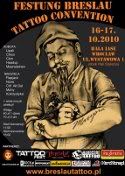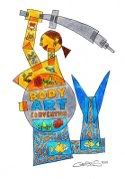skip to main |
skip to sidebar
731.
PL:
Inga Poslitur, rosyjska malarka mieszkająca na nowojorskim Brooklynie tak mówi o swoich pracach: "Spędziwszy wieczność na prywatnych rozmowach z kobietami które spotkałam w swoim życiu, zaczęłam zauważać pewną prawidłowość w tym, z czym wszystkie się zmierzamy. Społeczeństwo nakłada niesamowitą presję na kobiety, by najpierw rodziły dzieci, a dopiero potem zastanawiały się, czy chcą robić karierę. Powinny być paniami domu, żonami i matkami. Takie poświęcenie siebie w imię miłości, bez żadnego wsparcia czy szacunku ze strony społeczeństwa. Nie wspominając już o członkach rodziny, która wymaga od kobiety, by dbała o innych, kosztem siebie, by cudze potrzeby stawiała ponad swoimi. Mam wręcz wrażenie, że zbyt ambitne kobiety, albo te, chcące raczej robić karierę niż tworzyć rodzinę są piętnowane.
Takie zachowanie postrzegam jako odciskanie stygmatu na kobiecej psychice, zachowaniu i decyzjach, co poniekąd nawiązuje do tatuażu - niezmywalnego znaku na skórze. W moich pracach, tatuaż to fizyczne ukazanie tego, jak jesteśmy programowane. Mam nadzieję, że zwrócę tym uwagę na to, jak społeczne oczekiwania wpływają na kobietę. Chcę wpłynąć na kobiety, pokazać im, że mogą być niezależne i stawiać swoje potrzeby na pierwszym miejscu. I czasem nawet pośmiać się z siebie."
ENG:
Inga Poslitur, a Brooklyn-based Russian painter on her work: "Having had endless conversations on personal topics with women I met
in my life, I can see that certain social issues women are battling with
are largely universal. There is tremendous pressure from society on
women to have babies first before even considering a career path and
establishing themselves in the workforce. A pre-defined career path is
to be a homemaker, a housewife. This is widely considered to be a labor
of love, without direct compensation, or respect from the
society. There is also pressure from family members to place the needs
of others first and to take care of those to the detriment of
oneself. There is a certain stigma attached to women who are too
ambitious, or who want to build a career instead of having a family.
Such social conditioning, as I see it, is a permanent mark on women’s
behavior, psyche, and decisions. Tattoos are permanent markings on the
skin, and in this permanence, they are related to social
conditioning. In my series of paintings, tattoos are a physical
manifestation of the women’s programming.
With this series of paintings, I hope to bring attention to how
social expectations of family, religious institutions, and society
create conditioning, which influences women’s lives. I want to increase
this awareness among women in hopes that it may help them think and make
decisions independently, especially to take care of themselves
first. An occasional good laugh at ourselves is a welcome bonus, too."













